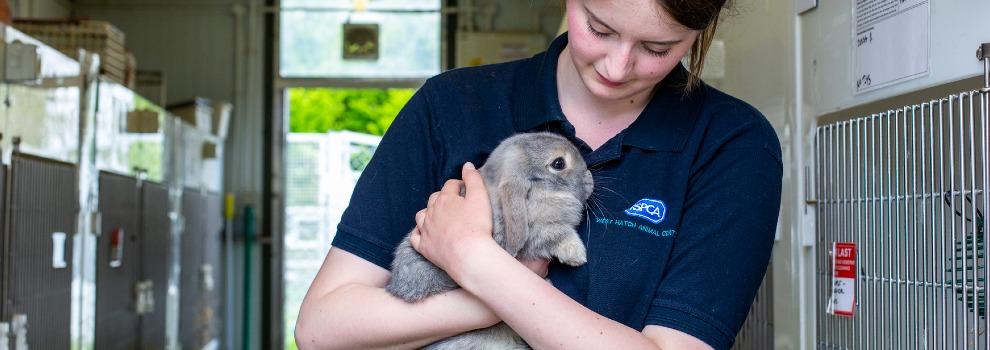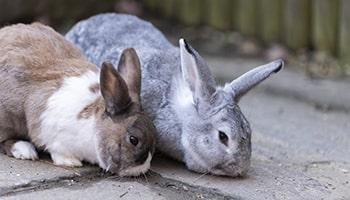It's crucial to get rabbit handling right as without correct handling it's possible your rabbits will see you as a threat – they’re a prey species so are on constant look out for predators.
Watch vet Molly demonstrate how to hold a rabbit so that your rabbits learn to see you as a friend and companion.
Top tips for handling rabbits
Start early
Get your rabbits used to human touch by socialising them early. We advise you to gently handle baby rabbits over 10 days old. Positively interact with kits for a few minutes every day so they associate being around people as a positive experience. Rabbits who aren't handled regularly from a young age, or who experience rough handling at any age, can find human contact distressing. We advise against handling rabbits younger than 10 days old as this may cause the mother to reject their kits.
Be gentle
Move slowly and talk quietly around rabbits so as not to startle them. They're more likely to be relaxed in a quiet and calm handling environment.
Covering the rabbit’s eyes with a towel or by the crook of your arm can help them feel more relaxed while being held, but you need to make sure their nostrils aren't blocked.
Be safe
It’s very important to hold rabbits safely. Their fragile spines can be seriously, or even fatally, damaged if they feel insecure and struggle when held.
Take note of these guidelines on how to handle rabbits without causing them harm.
- Hold rabbits gently but firmly. Ensure one hand supports their back and bottom at all times. Help them feel secure by holding all four feet against your body.
- Interact with your rabbit at ground level. This is less likely to scare them. And picking up your rabbit when you're close to ground level protects them from being dropped from a height by accident.
- Never pick rabbits up by their ears. This is extremely stressful for them and is highly likely to injure them.
- Never hold rabbits on their backs. Rabbits held this way often remain still and appear relaxed, which owners can think is a positive response to handling. However, rabbits find this experience extremely stressful and so 'play dead', just like they would to protect themselves after being caught by a predator.
- Restrain rabbits as little as possible. Reduce stress and minimise the risk of injury by restraining your rabbits only as much as is necessary. This will depend on their temperament, health status and the procedure to be carried out (such as carrying out health checks and taking your rabbit to the vet).
- Supervise children at all times. Only adults or responsible older children should be able to pick up rabbits.
Avoid placing rabbits on a slippery surface. Putting a towel down can help make rabbits feel more secure.
If you're concerned about your rabbit's behaviour, ask a vet to rule out any form of illness or injury that could be causing problems. Their reaction to handling may also depend on their past handling experiences, so you'll need patience to help grow their confidence around people.
Training your rabbit
Rabbits are intelligent and playful animals and can be taught skills, such as coming when called and going back to their cage on cue. These are a fun and less stressful way of catching your rabbit.
Training can provide mental and physical simulation for your rabbit and also improve your bond with your pet.
Only use positive training methods, such as ‘clicker’ training followed by a treat (from your rabbit’s daily allowance of food). Never use punishment techniques, like shouting, as these are likely to make your rabbit nervous or scared. You can find out more here.
A behaviour expert can explain how to train your rabbit.




